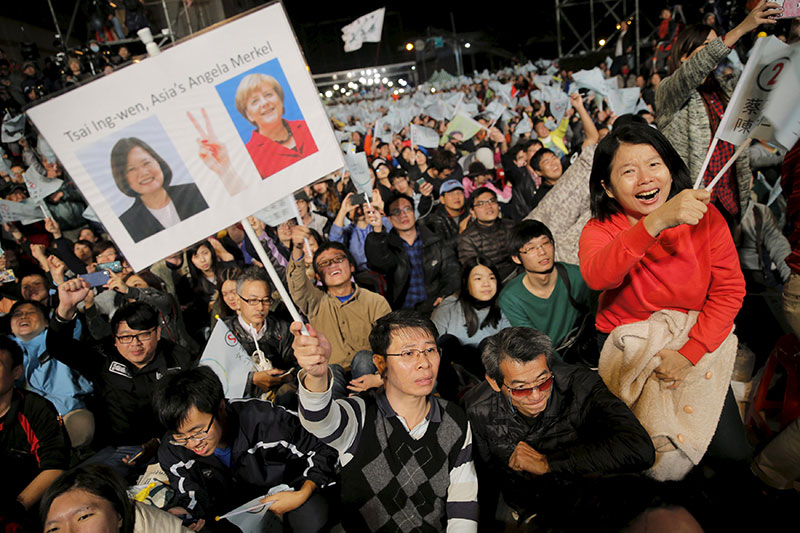TAIPEI (Reuters) - Taiwan's independence-leaning opposition leader Tsai Ing-wen won a convincing victory in presidential elections on Saturday and pledged to maintain peace with giant neighbor China, which warned it would oppose any move towards independence.
Tsai, the leader of the Democratic Progressive Party (DPP), will be thrust into one of Asia's toughest and most dangerous jobs, with China pointing hundreds of missiles at the island it claims, decades after losing Nationalists fled from Mao Zedong's Communists to Taiwan in the Chinese civil war in 1949.
Tsai said she would establish "consistent, predictable and sustainable" relations with China and not be provocative, to ensure the status quo.
She risks antagonizing China if she attempts to forcefully assert Taiwan's sovereignty and reverses eight years of warming China ties under incumbent President Ma Ying-jeou of the Nationalists.
"Both sides have a responsibility to do their utmost to find mutually acceptable ways to interact with respect and reciprocity and ensure no provocation and no surprises," Tsai added, having taken around 56 percent of the vote.
She added, however, that she would defend Taiwan's interests and its sovereignty. China has not renounced the use of force to ensure eventual unification with the island.
"Our democracy, national identity and international space must be fully respected and any suppression would undermine the stability of cross-Strait relations," she said.
In a statement carried by state media, China's Taiwan Affairs Office said the achievements and peace of the past eight years should be cherished, and that it would not tolerate any Taiwan independence activities.
"On important issues of principle like protecting the country's sovereignty and territorial integrity, our will is as hard as rock," it said.
China was willing to have exchanges with any party, as long as they recognize both sides of theTaiwan Strait belong to one China, it added.
Support for the DPP has swelled since 2014, when hundreds of students occupied Taiwan's parliament for weeks protesting against a China trade bill in the largest display of anti-China sentiment the island had seen in years.
Outside DPP headquarters, supporters cried for joy.

Optometrist David Chen, 28, said he wanted Tsai to stand up to China.
"We're not a part of China. I definitely think we should exist as two countries," he told Reuters. "If it's possible for Tsai, I want her to push for independence. More and more Taiwanese people want this."
Tsai, a lawyer, got an even stronger mandate as the DPP also won a majority in parliament in polls held the same day.
Tsai will have to balance the superpower interests of China, which is also Taiwan's largest trading partner, and the United States with those of her freewheeling, democratic home.
TAIWAN DOLLAR SUFFERS
The U.S. State Department said it looked forward to working with Tsai.
"We share with the Taiwan people a profound interest in the continuation of cross-Strait peace and stability," it said.
Still, underscoring investor worries about uncertainty following her possible victory, on Friday theTaiwan dollar ended lower against the U.S. dollar in its weakest closing since April 2009. Following the vote, a senior central bank official told Reuters that Taiwan's central bank "always maintains stability in the market".
Perhaps fearful of allowing discussion about democracy on an island Beijing says it owns, Chinese censors moved swiftly to block searches for Tsai's name on Weibo, China's answer to Twitter.
Some Chinese managed to post about the vote though.
"Why is there no election for the chairman in China? I condemn this," said one Weibo user.
Relations had already been strained by a 16-year-old Taiwan singer with a South Korean girl band who inadvertently shot to the top of the election agenda on polling day after she publicly apologized for holding a Taiwan flag, prompting China and Taiwan to trade accusations.
Tsai referred to the spat in her victory speech, saying the incident would remind her that as president her most important duty was to unite and strengthen the country.
The election comes at a tricky time for Taiwan's export-dependent economy, which slipped into recession in the third quarter last year. China is also Taiwan's top trading partner and Taiwan's favorite investment destination.
Tsai has the tide of history against her. Ma and his predecessors all failed to bring about a lasting reconciliation with China.
Shots were traded between the two sides as recently as the mid-1970s.
At stake are relations with an ascendant and increasingly assertive China under President Xi Jinping.
Tsai has been ambiguous on her China policy, merely pledging, in public anyway, to maintain the status quo. Beijing has warned repeatedly that hard-earned peace across the Taiwan Strait could be affected by a Tsai win.
The United States has expressed concerns about the danger of worsening China-Taiwan ties, at a time when China's navy is increasingly flexing its muscles in the South China and East China Seas and expanding territorial claims.
China has held out the "one country, two systems" formula, under which the British colony of Hong Kong returned to China in 1997, as a solution for Taiwan. But both the Nationalists and DPP have rejected the idea.
(Additional reporting by Faith Hung, Yimou Lee and James Pomfret, and Sui-lee Wee in Beijing; Editing by Nick Macfie)






